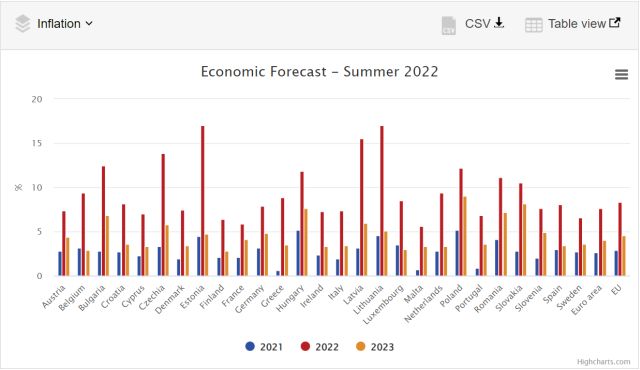Inflation Worries
The risk of a recession has been the highest after July 2020

Corina Cristea, 23.09.2022, 17:17
The risk of a recession has been the highest after July 2020, against worries that an energy crisis during the winter would shrink economic activity, according to economists with Bloomberg. Homes and companies in Europe are already preparing for possible energy rationing, after Russia choked off gas deliveries to the continent. In parallel, they are struggling with record inflation and supply chain blockages. Polling in the business sector indicate that activity has been going down since July. At the same time, inflation is expected to reach a peak of 9.6% in the last three months of the year, almost five times above the target set by the ECB. Romania, a country that still aspires to join the Eurozone, is facing difficulties too. In a national bank report from a month ago it is said that inflation is rising fast, and has gone above 15 percent, against shocks caused by the exorbitant price of energy, fuel, and the growing price of foodstuffs. Speaking on Radio Romania, economics professor Mircea Cosea said that inflation has likely not reached the highest point this year:
“We will be seeing a rise in inflation. Not too much, not spectacularly, but it will grow. For the time being, the important factors leading to this rise have not diminished in importance. For energy, we dont have any good news, Russia turning off the gas had a negative effect. However, I am more interested in the situation in Romania. This figure of 15.3% is a sort of average price for many products. Right now we are interested in basic products, consumed by the population the most. We are talking about food. In this case, inflation is much higher. There is a rise which, by some calculations, is as high as 28 to 30%, maybe even higher lately. The question is what to do to temper this inflation that affects the products that the Romanian population consumes the most. We cant perform miracles, but something can be done, by forcing higher provisions on the Romanian food market.”
If the executive manages to push to the market more Romanian markets, increasing supplies, as explained by Professor Cosea, imports would go down, which would allow inflation to reduce. Otherwise, he doesnt believe that inflation can go down over the next few months. It may start trending down towards the half of next year, if Russia was forced by circumstances to restart sending natural gas to Europe. Here is Mircea Cosea once again:
“For the time being, they found a workaround, by sending it to China and India, but this does not cover what they would have earned by sending it to Europe. For the time being, Russia is the clear winner in terms of income, after sanctions imposed by Europe, but this is only temporary. Russias economic situation is worsening by the day, and in the end it has to get back to what is most important, which is revenues. In trade terms, Russia is poorly developed, it lives off of primary exports of energy and raw materials. However, so far the situation in politics is dire. I dont believe we will see a moderation in inflation, on the contrary, we could see a rise.”
Meanwhile, prices continue rising in Romania, even though it is at a slower pace. Romanians are having a harder time coping with the hikes, especially since their income has been stagnant, or have been boosted to a small degree, way below the rate of inflation. According to economic analyst Adrian Negrescu, this inflation is completely disconnected from the standard of living in Romania and the economic situation:
“Yes, inflation affects everyones pockets, each and every one of us. We are paying more in supermarkets, Ive said it time and again, visiting a store has become like going to a museum, we just admire the products, or if we buy, we buy by the ounce. Beyond this situation of peoples pockets being affected by the inflation, the big problems right now, it seems to me, is the inflation in the economic and production areas. The rise in prices right off the factory gate by more than 50% is a harbinger of a continuing inflationary storm that we have been feeling for the last few months, and which will worsen. We wont easily get rid of inflation, because unfortunately we wont take the necessary measures to curb two of the essential components of this inflationary mechanism. The first is the energy area, where we just put some ointment on a sick man almost in a coma, which is what the Romanian economy looks like. We didnt take the necessary measures to ward off price hikes through fiscal measures. Secondly, there is the commerce issue in Romania, which unfortunately is another speculation area, based more and more on imports.”
Negrescu added that inflation is like an elastic band, which may break if stretched too much, meaning that companies would become unable to sell merchandise and services, leading to a blockage in the whole economy.






























